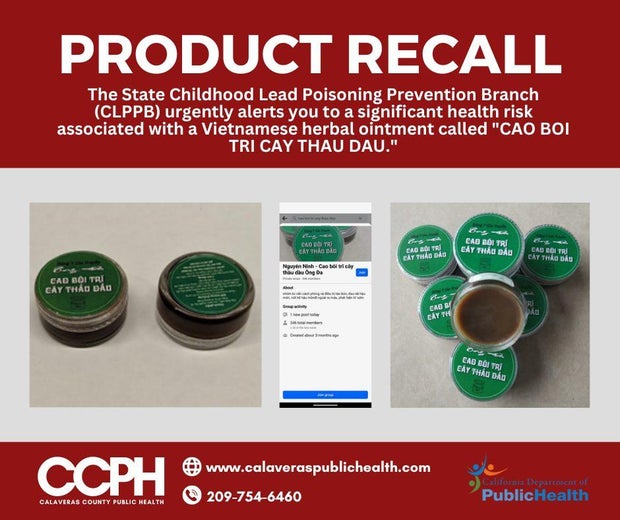[ad_1]
The fatal poisoning of a California resident who had ordered a Vietnamese herbal ointment for hemorrhoids online is a recent example of lead — a dangerous and toxic metal — showing up in imported products. The list in recent months has included items ranging from apple sauce, ground cinnamon and bracelets to sippy cups, water bottles and dark chocolate.
Local officials issued a public health alert Tuesday after a woman in Sacramento developed severe lead poisoning and died after using a hemorrhoid ointment from Vietnam called Cao Boi Tri Cay Thau Dau. The California Department of Public Health tested a sample of the ointment and found it contained what it described as “a highly dangerous amount of lead,” or 4%, according to the county’s alert.
The deceased woman had purchased the ointment on Facebook, and it was mailed to the U.S. by a relative in Vietnam, the agency stated in a news release. It was not immediately clear if people can buy the ointment directly in the U.S. But any consumers with the ointment should stop using it and get their blood tested for lead, California health officials advised.
The product is marketed primarily through Facebook groups in Vietnamese as a so-called “miracle” treatment for hemorrhoids with “suggest intra-rectal application,” according to a post by California’s Calaveras County Public Health.
Calaveras County Public Health
The Food and Drug Administration — the agency that oversees regulations governing dietary supplements — did not respond to a request for comment.
Lead-based paints have been banned in the United States since 1978, but the metal can show up when paint peels or cracks in homes build before then, according to the Centers for Disease Control and Prevention. Yet lead can also be found in some products such as toys, jewelry, candies or traditional home remedies and has shown up in drinking water and in soil contaminated by industrial and other sources, the agency said.
The metal has been found in certain spices imported from countries including Vietnam, India and Syria, and has also been found in powders and tablets given for ailments from arthritis to menstrual cramps, the CDC noted.
The first three months of the year has seen a discomforting number of consumer warnings and/or recalls of products tainted with the toxin, including croquet sets made in India and sold on Amazon, jewelry made in China and sold at Skechers stores nationwide and child tiaras embedded with lead-tainted rhinestones, that were made in China and sold on Amazon.
Advocacy groups have long sounded alarms about lead.
A study released in September by international nonprofit Pure Earth found excessive levels of lead in 18% of more than 5,000 consumer and food products from 70 marketplaces in 25 countries.
“Lead pollution knows no boundaries,” Richard Fuller, Pure Earth’s president, stated in a news release announcing the study. “Our research indicates that hundreds of millions of people have elevated blood lead levels due to continuous, long-term exposure to household lead sources increasing serious health risks across lifespans. More people are dying from cardiovascular disease caused by lead exposure than by cholesterol.”
Long-term exposure to even small amounts of heavy metals can lead to a slew of health issues, including developmental problems and brain development in young children, experts say.
Most people do not show obvious immediate symptoms of lead exposure, but prolonged exposure to the metals is considered unsafe.
Exposure to lead in utero, infancy and early childhood can lead to harmful neurological effects like learning and behavior disabilities and lowered IQ. For adults, chronic lead exposure is linked to kidney dysfunction, hypertension and neurocognitive effects.
[ad_2]
Source link







